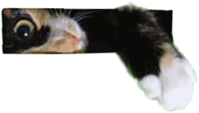Cat in English

Among the many ways cats have enriched our lives, they have left their paw tracks across the English language. Below is a list of phrases and expressions related to cats. Notice that one or two of them refer to acts of barbaric cruelty which no rational person would tolerate today.
A cat can look at a king: Meaning that there are some basic things which anyone can do, no matter how mighty the other person is.
All cats are grey in the dark: From Benjamin Franklin's list of reasons for loving an older woman. Today used to mean if the difference can't be seen, what does it matter?
Be the cat's whiskers: British and Aussie expression meaning to be the best in a group, the one who is better and more special than the others.
Bell the cat: To do something good for everyone except the person who does it. From a pble in which the mice decide that it would be excellent if the cat wore a bell to warn the mice of its approach - but which mouse would bell the cat?
Cattus: A Latin expression for a cat, originally used by the epigrammist Martial in AD 75. Interestingly the Roman goddess of Liberty was portrayed with a cat at her feet - of all domesticated animals, the Romans knew cats were the most free. This vulgar Latin term for a cat replaced the more formal 'felis' and was universal in Europe by about AD 700. From there it successively moved into Germanic languages, Middle English and modern English.
Catcalls: First recorded 1659, as the sound by which the audience expressed disapproval of a theatrical act. Compare with 'caterwauling' from the old English "cat's wailing" - the sound a love-struck tomcat makes in an alley.
Cat-house: Slang for a brothel. This is based on the 15th century term for a prostitute. (Presumably many people have ended up in the doghouse after a visit to a cat house!)
Cat killer: Drug user's term for Ketamine. Actually, vets use Ketamine mainly as a pain-killer, rather than to put cats to sleep.
Catnap: A quick, impromptu nap. The expression has been in the language since about 1820.
Cat o' nine tails: An expression dating to about 1700. The 'o' is short for 'of' as in 10 o(f the) clock. A rope in a sailing ship (some types of ship's rope were called 'cats'). When the rope was splayed out, it formed three six or nine strands. Its victims used to say that had been 'scratched by the ship's cat'. The punishment was abolished in the Royal Navy in 1881.
Cats have nine lives: A reference to the ability of cats to get out of tricky situations, and land on their feet, which are padded to soften the fall. The choice of nine for the lives refers to three times three. ('Three' being the number of the Trinity is considered a lucky number in western cultures). The expression goes back at least as far as Shakespeare's time, when in Romeo and Juliet Mercutio says to Tybalt 'Good king of cats, [I want] nothing but one of your nine lives.'
Cat's cradle: Described here in 1768, from Abraham Tucker's 'The light of nature pursued' "An ingenious play they call cat's cradle; one ties the two ends of a packthread together, and then winds it about his fingers, another with both hands takes it off, perhaps in the shape of a gridiron, the first takes it from him again in another form, and so on alternately changing the packthread into a multitude of figures whose names I forget, it being so many years since I played at it myself."
Cat's paw: Either someone who acts as an agent for someone else (usually doing dark deeds). Or a light wind that causes a ripple on the water, often just before a storm. The latter expression dates to 1770, and the cats in question were not domestic moggies but the familiars (companion spirits) of demons.
Cool Cat: Someone who is trendy, and usually fond of music and fashion. From the 1920s USA
Curiosity killed the cat: Meaning that it can be dangerous to investigate too far. Anyone who has seen a cat trying to find out what is on the other side of a busy road need enquire no further into the origins of the expression.
Dead cat bounce: When shares in a company go into free fall there is a belief in stock market professionals that they will eventually rise again, even if only slightly, and temporarily. (As in 'Even a dead cat will bounce, if you drop it from high enough')
Fat cat: A business executive who earns a massive salary and who is believed to do very little to deserve it. Now why should people who live very well for very little effort be compared to cats?
Fight like cat and dog: Meaning to have temperaments that are unsuited to each other, and therefore fights start at the slightest provocation. This expression is hotly disputed by the many people whose dogs and cats live in perfect harmony. "There will be jealousies, and a cat-and-dog life over yonder worse than ever" from Carlyle: Frederick the Great.
Fight like Kilkenny cats: To fight viciously and without quarter. Apparently from the practice of 18th century mercenary troops based in the Irish province Kilkenny of tying the tails of two cats together and then throwing them over a clothes line to watch them fight.
Has the cat got your tongue?: From a 17th century belief that cats were agents of the devil, and had the power to strike people dumb.
Let the cat out of the bag: This is linked to the expression 'a pig in a poke'. Piglets were sometimes sold in a sack (a poke) at the fair, and sometimes it might not be a pig at all, but a (highly indignant) cat. When the bag was opened, the secret was out, and like a cat that has spent any time in a bag, impossible to put back.
Like a cat on a hot tin roof: Someone who is in an very uncomfortable situation, or nervous and fidgety. Memorably, a play by Tennessee Williams which won the Pulitzer Prize for Drama in 1955.
Like the cat that got the canary/cream: To annoy people by looking very pleased with yourself, whether you deserve to or not.
Look what the cat dragged in: One way of announcing the arrival of someone you do not want to see. Especially if that person is not looking too good.
Not have a cat's chance in hell: Meaning have no chance. Another reference to cats being satanic beasts, and therefore damned.
Play cat and mouse: Cats have to be taught how to kill a mouse (by biting through the back of the neck). A cat that has not been taught the technique by its mother will still catch the mouse through instinct, but will not be sure what to do with it next, apart from stopping it from getting away. Now an expression for any situation where one party has the power, but waits before using it.
Pussy: Affectionate term for a cat. Also a 19th century Gaelic expression meaning 'mouth'. Since then the term has moved southwards Cf The (in)famous painting The girl with two pussies which shows a young lady with a cat in her arms and nothing else at all.
Pussyfoot: Expression for the early 20th century. To walk carefully, or be indecisive. To dodge or evade or try to go around an issue. Watch a cat on a wet lawn for more details.
Put the cat among the pigeons: Do something that you know will cause a major ruckus and make people angry and upset.
Raining cats and dogs: No-one is certain where it comes from, though it is at least 300 years old. Perhaps the German gods of wind and rain (symbolized by cats and dogs) or the Greek for 'against all experience' (kata doxa). However, though rains of fish have been recorded, it has never rained cats and dogs. (And please do not mention the unfortunate incident where a crate carrying car parts came loose from the aeroplane, and it briefly rained Datsun cogs.)
Room to swing a cat: Probably not a reference to the cat o'nine tails, since it is recorded earlier (in 1665). Probably a reference to the practice of putting a cat in a bag, setting the bag swinging, and using it as a target in archery.
See which way the cat jumps: Australian expression meaning wait and see how the situation develops before committing yourself.
There are more ways of killing a cat than choking it with cream: This self-explanatory proverb is mentioned in in Charles Kingsley's Westward Ho! in 1855. Not to be confused with the following proverb.
There's more than one way to skin a cat: For once not an act of cruelty to cats. Catfish have rubbery and bad tasting skin which is hard to remove. Boiling and flaying the skin are among the techniques that have been tried. Several are possible, and they all work.
While the cat's away...: ... the mice will play. when the person who is meant to keep things under control is not there, a certain informality may develop.
THE END

